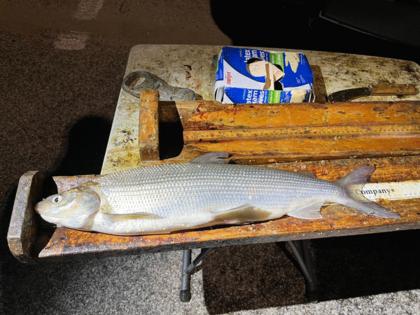Whitefish decline a 'big' problem in Great Lakes, DNR biologist says
Published in Science & Technology News
The story of Great Lakes whitefish is not a happy one, state fish biologist Stephen Lenart warned on Thursday, but it needs to be told as their numbers decline.
Lenart presented the uncomfortable facts about the iconic Great Lakes species during a Michigan Natural Resource Commission meeting on Thursday.
The long-lived fish are prized table fare and important to tribal commercial fishers, said Lenart, a Michigan Department of Natural Resources biologist and tribal coordination unit manager.
Their population is in steep decline, particularly in the main waters of lakes Michigan and Huron.
Great Lakes Fishery Commission records show whitefish harvests in Lake Michigan were 8.3 million pounds in 1993 and stayed above 7 million through 1998. In 2020, the Lake Michigan whitefish harvest was 2.1 million pounds.
"It's a big, big, big problem," Lenart said. "But we've solved big, big, big problems before."
Invasive quagga and zebra mussels are largely to blame for the decline in Great Lakes whitefish, Lenart said. The mussels gobbled up the vast majority of the small creatures such as shrimp-like Diporeia that were critical to the Great Lakes food web.
Young whitefish depend on those small creatures. Without them, the whitefish don't have enough to eat to survive into adulthood.
"You start plucking strings from the (food) web and things collapse," he said.
The decline in whitefish is a difficult issue for the DNR to combat, Lenart said.
Tribal and state governments agreed to reduce the numbers they allow commercial fishers to harvest. Ending the commercial harvest of whitefish altogether also would threaten the interest people have in protecting whitefish, said Randy Claramunt, DNR fisheries division chief. He said the department wants the commercial fishery to survive.
"If the whitefish industry doesn't survive, then the commitment to monitor, the commitment to assess, to try these new things, will be lost," he said. "If we close all fisheries then we lose the industry. Then even if the population recovers, we may not recover the industry."
Fish experts throughout Michigan are trying to save whitefish.
Tribes including the Little Traverse Bay Band of Odawa Indians have participated in dozens of research projects to help the fish, including stocking the fish in rivers, a project undertaken in partnership with the DNR and other groups. Tribal fish hatcheries also raise thousands of whitefish for stocking programs and research.
Other scientists are studying whether the fish are sensitive to certain diseases, studying the impact ultraviolet light has on whitefish eggs, searching for the best ways to raise fish in hatcheries and more. Federal scientists from the U.S. and Canada launched the Invasive Mussel Collaborative to study ways to control quagga and zebra mussels.
Lenart stressed the value of work conducted by the U.S. Environmental Protection Agency and National Oceanic and Atmospheric Administration, which monitor the base of the food web and invasive mussel levels.
"We would be trying to box with one hand tied behind our back without information on lower food webs, without information about what's happening with the density of mussels in the system, zooplankton communities," he said.
Lenart said he is concerned staffing and projected budget cuts to federal agencies will impact those programs.
"I think sometimes these things are looked at as abstract academic things and I want to make sure people understand that if they care about us understanding fish populations, they should care about us understanding those populations as well," Lenart said. "A lot of that is done by federal partners."
Teresa Seidel, director of the EPA's Great Lakes National Program Office, said the monitoring work Lenart described is ongoing this summer and is expected to be funded going forward. The work is supported by the Great Lakes Restoration Initiative, a program aimed at Great Lakes cleanup and research that tends to receive strong bipartisan support in Congress.
"At this time, we believe the budget for next season looks like it's going to be fully intact," she said.
NOAA's Great Lakes Environmental Research Laboratory in Ann Arbor studies Great Lakes ecosystem dynamics including the food web and invasive mussels.
President Donald Trump zeroed out funding for NOAA's Office of Ocean and Atmospheric Research in his 2026 budget request as part of the administration's stated goals of winnowing the federal government and ending climate work. The Ann Arbor lab is under that NOAA office.
_____
©2025 The Detroit News. Visit detroitnews.com. Distributed by Tribune Content Agency, LLC.







Comments